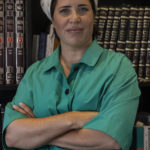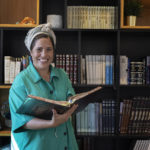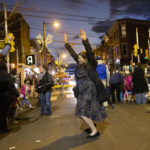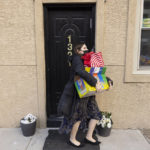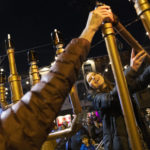More Orthodox Jewish women are ordained; change is uneven
Dec 13, 2021, 5:40 PM | Updated: Dec 14, 2021, 7:46 am
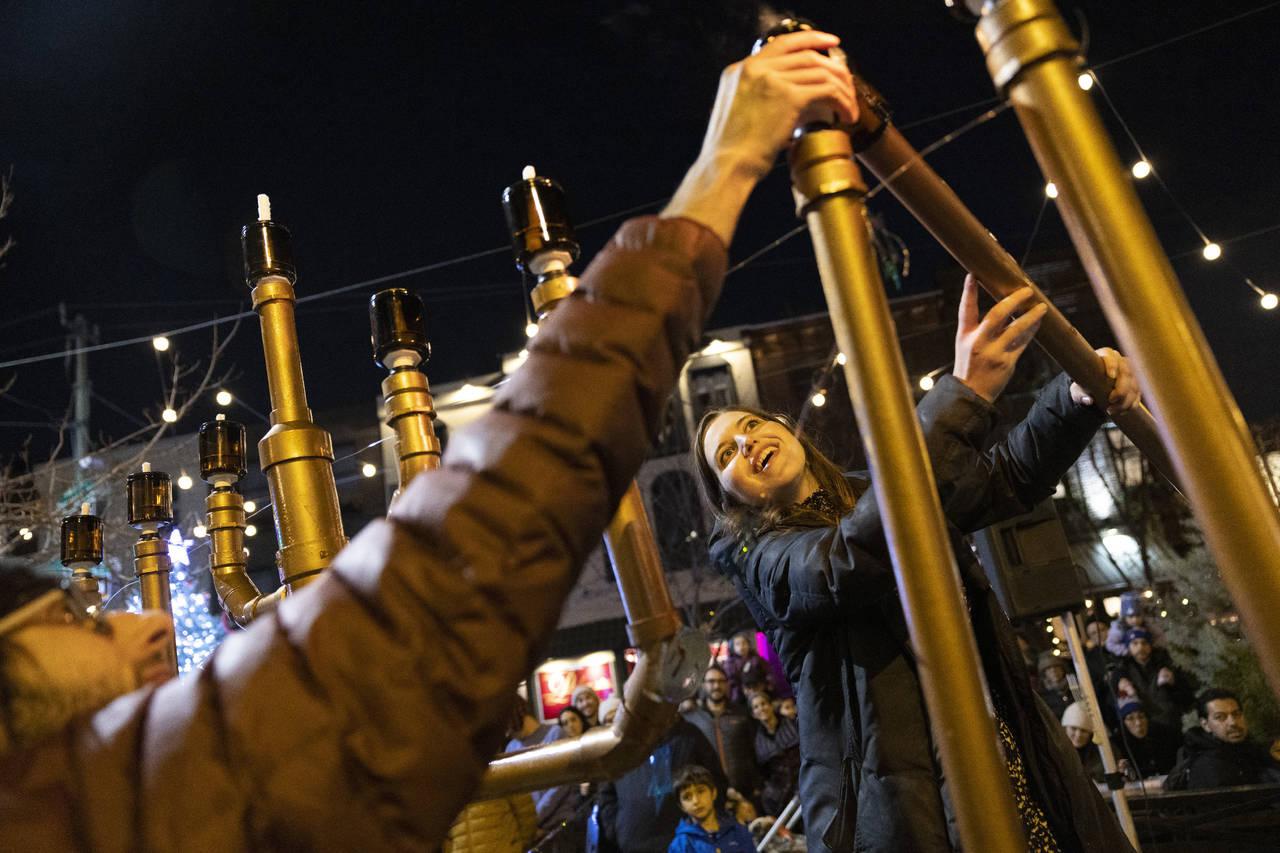
Rabbanit Dasi Fruchter, of the South Philadelphia Shtiebel, lights a menorah during a public Hanukkah celebration and menorah lighting ceremony in South Philadelphia on Sunday, Dec. 5, 2021. Fruchter is one of about a half-dozen ordained women who serve Modern Orthodox synagogues across the U.S. and one of even fewer who serve as top spiritual leaders. (AP Photo/Ryan Collerd)
(AP Photo/Ryan Collerd)
At the South Philadelphia Shtiebel, a 5-foot-tall partition, called a “mechitza,” separates the men from the women in accordance with ancient tradition.
But when it comes time for the sermon, Rabbanit Dasi Fruchter, the Modern Orthodox congregation’s leader, steps up to the podium, a juxtaposition that confuses many looking in from the outside.
“People walk into the space saying, ‘What? I don’t get it,'” said Fruchter. “It’s hard to get. Everything feels in between.”
Fruchter is one of half a dozen or so ordained women who serve Modern Orthodox synagogues across the U.S., and one of even fewer who serve as top spiritual leaders. While the larger Reform and Conservative Jewish movements have ordained women rabbis for decades, the Orthodox fold has only recently begun tapping women to leadership roles.
___
This story is part of a series by The Associated Press and Religion News Service on women’s roles in male-led religions.
___
Modern Orthodoxy, which aims to hold onto Jewish tradition while engaging with the outside world, is leading the way. But as the seating arrangement in South Philadelphia demonstrates, the changes are halting and somewhat uneven.
The divided seating harks back to the Jerusalem Temple, when only men — and then only priests — were allowed near the inner sanctum. That practice has been even harder to recast than male rabbinic leadership, which came later in Jewish history and is less defined in halacha, or Jewish religious law.
Fruchter, who is 31 and not married, was earning a graduate degree in nonprofit management and Jewish studies at New York University when she heard about Yeshivat Maharat, in the Bronx, the only U.S. seminary that ordains Orthodox Jewish women. Ordained in 2016, she immediately landed a job as an assistant rabbanit at an Orthodox congregation in Potomac, Maryland. (Many ordained Orthodox women do not use the word “rabbi,” preferring the Hebrew feminine “rabbanit.”)
In 2018, Fruchter was approached by a group of foundations interested in creating more leadership positions for Orthodox women. After months scouting potential locations, she settled on South Philadelphia, where the Jewish community has thinned out in recent decades as people migrated to the suburbs. The congregation she dubbed the Shtiebel, (the word comes from the Yiddish for a small, homey house of worship), was launched in July 2019, with a Friday night service attended by 75 people in a rented space.
Yeshivat Maharat has ordained 50 Orthodox women since it opened in 2009, and has an enrollment of 46 in its three ordination tracks, said Rabba Sara Hurwitz, the school’s co-founder, president, and the first Modern Orthodox woman rabbi ordained in the U.S., in 2009.
In Israel, where Orthodoxy is the only branch of Judaism recognized by the state, a handful of seminaries ordain women and a growing number of academies train women in Jewish law. Orthodox women now serve as school principals, community educators and legal authorities.
A rare few, such as Rabbanit Shira Marili-Mirvis, have become leaders at more progressive Orthodox synagogues.
“I never had a dream when I was a girl of being a rabbanit,” said Marili-Mirvis at her home in the West Bank settlement of Efrat, her hair covered in line with Orthodox custom for married women. “It wasn’t an option. It wasn’t something I saw around me.”
Attending seminary after high school, she developed a passion for studying the intricacies of halacha. She eventually enrolled at Ohr Torah Stone, a Jerusalem seminary that teaches Talmud to women with the aim of preparing them to become community leaders.
Several years ago, she moved to Efrat, an Israeli settlement south of Jerusalem in the occupied West Bank. Home to a large community of American Jewish immigrants, Efrat has become a focal point for Modern Orthodoxy.
Marili-Mirvis said her decision to move to Efrat was “not a declaration of political or ideological intentions,” rather, it stemmed from practical considerations and a desire to be part of an observant community that would be open to a rabbanit.
Her newly fledged congregation, Shirat HaTamar, comprises about 45 families from various Jewish ethnic traditions: Ashkenazi Jews as well as Jews of Tunisian, Yemenite, and Moroccan origin. One of its aims is “to include women as much as possible within the guidelines of halacha,” she said.
While she delivers sermons and provides halachic guidance to her congregants, Marili-Mirvis isn’t permitted to lead prayers or read from the Torah on the sabbath.
“There are many limitations, but I have to say that I accept it and I accept it with love,” she said. “I understand that when I choose a life that is obligated to halacha, there will be parts that halacha doesn’t see me exactly equal.”
Marili-Mirvis said she has received “very warm responses” since the congregation made her appointment as its rabbanit official earlier this year, but the state of Israel, whose religious matters are often determined by conservative ultra-Orthodox authorities, has not recognized her position. Women are not even allowed to take the exam that qualify rabbis as experts in halacha and entitle their congregations to state funding.
In the U.S., too, the Rabbinical Council of America or the Orthodox Union, the leading organizations for Orthodox Jews, oppose women’s ordination.
But neither has the Orthodox Union, which has some 400, mostly Modern Orthodox, affiliating congregations, taken the step of expelling congregations that have hired an ordained woman.
“What we’re seeing happening now in the Orthodox community is that people are beginning to imagine that there is no halachic barrier to women serving as rabbis and remaining fully committed to Orthodoxy,” said Brad Hirschfield an Orthodox rabbi who is president of the National Jewish Center for Learning and Leadership. “That’s not yet across the board, by any means. It might take a generation or two, but it will become normative to have Orthodox women rabbis.”
Hirschfield thinks even the most strictly observant Orthodox, or haredi, Jews, will eventually accept ordained women.
The wives of haredi rabbis are already staking out more professional roles for themselves and taking advantage of advanced training, said Michal Raucher, assistant professor of Jewish studies at Rutgers University.
For now, most of the 50 women ordained through Yeshivat Maharat serve not as rabbis but as educators or in other professional synagogue roles.
“I don’t think the goal or project of Maharat was to place a woman in every Modern Orthodox synagogue,” said Hurwitz. “But I do think the Orthodox communities that are looking are realizing that women have a lot to offer.”
In the meantime, synagogues like the South Philadelphia Shtiebel are chartering a new course. Fruchter said she trains girls for the bat mitzvah coming-of-age ceremony and must also explain why — at least for now — women may not be able to publicly read from the Torah during a Shabbat morning service.
“Orthodox women’s leadership is navigating what it is,” said Fruchter of South Philadelphia Shtiebel. “We have halachic pieces we have to address, communal pieces we have to address. Ultimately we’ll lead with kindness, creativity and relevance and see what emerges.”
___
Yonat Shimron reported from the U.S.; Ilan Ben Zion from Israel.
___
Associated Press religion coverage receives support from the Lilly Endowment through The Conversation U.S. The AP is solely responsible for this content.
Copyright © The Associated Press. All rights reserved. This material may not be published, broadcast, rewritten or redistributed.







